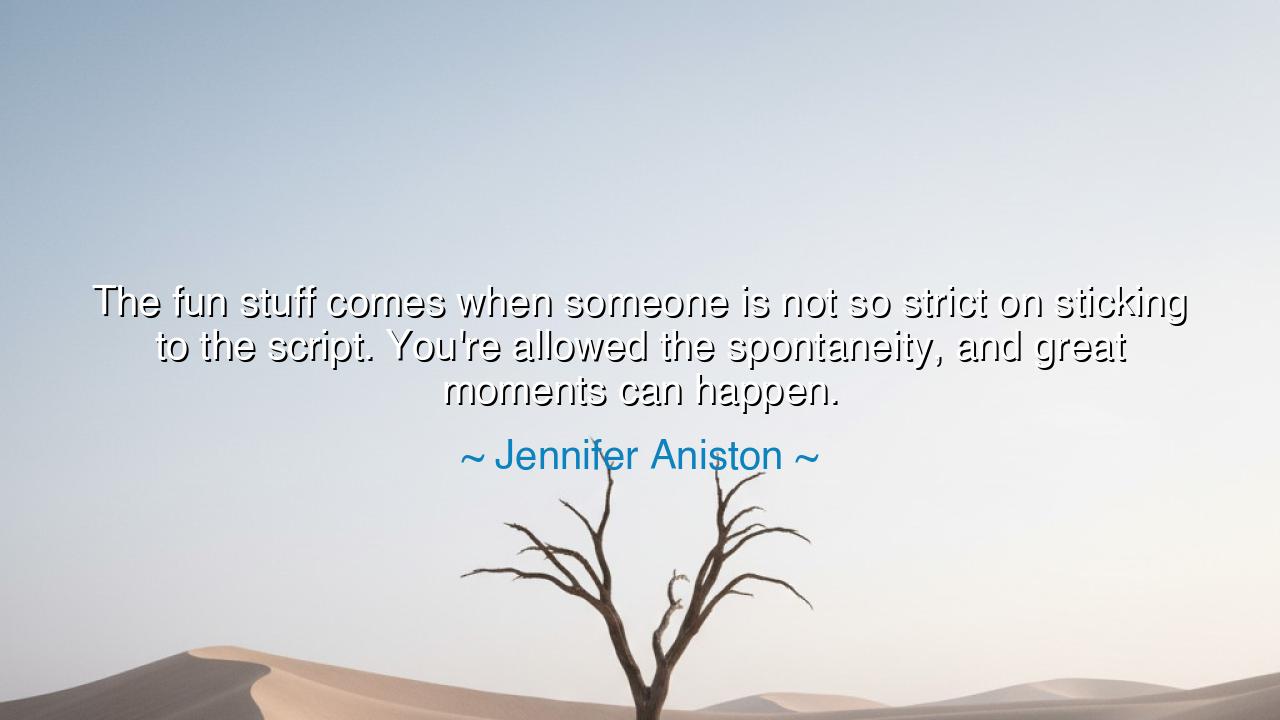
The fun stuff comes when someone is not so strict on sticking to
The fun stuff comes when someone is not so strict on sticking to the script. You're allowed the spontaneity, and great moments can happen.






“The fun stuff comes when someone is not so strict on sticking to the script. You’re allowed the spontaneity, and great moments can happen.” Thus spoke Jennifer Aniston, an artist who has long danced between structure and freedom, between the written word and the living moment. In these words, she reveals a truth that reaches far beyond the stage or screen—a truth about life itself. For she speaks not only of acting, but of existence, of the divine art of living fully. The script is the plan we are given, the pattern laid before us by duty, habit, or fear. But the spontaneity—that sacred spark of the unscripted—belongs to the soul’s own creation. It is there, in those unplanned moments, that true greatness often hides, waiting to be found by the brave and the open-hearted.
Aniston’s reflection arises from her world of performance, where stories come alive through both precision and improvisation. Every actor begins with a script, a carefully crafted map of dialogue and direction. But a script, no matter how perfect, is lifeless without breath, without human truth. It is only when the actor dares to step beyond the written word—when they respond not with memorized lines but with real feeling—that magic occurs. A pause unplanned, a glance not scripted, a laugh that bursts naturally—these are the moments that make art immortal. So it is with life: it is not the rehearsed gestures that shape our beauty, but the unrehearsed truths that reveal who we truly are.
The ancients, too, understood this mystery of creation. Socrates, who spoke freely in the marketplace, never wrote a single word of his philosophy, for he believed truth could not be scripted—it had to be discovered through conversation, through living exchange. Leonardo da Vinci, the eternal student of the world, once said that art is never finished, only abandoned; for he knew that perfection lies not in control, but in the courage to explore. Even in the theater of Shakespeare’s day, actors were given freedom to improvise, to weave humor or depth into their lines. From that looseness, from that willingness to risk imperfection, came the greatness that endures through centuries. Spontaneity, when guided by wisdom, is the soul’s rebellion against stagnation—it is life breaking through the lines of its own story.
There is a kind of fear that clings to the script, both in art and in life. Many live as though the pages were already written for them, afraid to deviate from expectation, afraid to say or do the wrong thing. They recite their lines—dutifully, efficiently—but without joy. Yet life, like the stage, was never meant to be only memorized; it was meant to be felt. The wind changes, the audience shifts, and the scene transforms before our eyes. Those who insist on controlling every breath and every moment soon find that their performance feels hollow, their existence too rigid to hold wonder. But those who dare to let go—to laugh unexpectedly, to try, to fail, to listen deeply—find that life itself begins to respond.
Consider the tale of Alexander Fleming, the scientist who discovered penicillin not through plan, but through chance. His experiment failed by every standard of his time—but instead of discarding it, he looked closer, curious about what had gone wrong. What he found changed the course of medicine and saved millions of lives. His discovery was born of spontaneity, of allowing the unexpected to speak. It is proof that even in science—the realm most bound by rules—greatness blooms from openness, not rigidity. The same truth holds for the heart: the most profound loves, the truest friendships, and the deepest joys come when we allow life to move unscripted.
Jennifer Aniston’s words carry this timeless message: structure is the foundation, but spontaneity is the breath of life. Discipline has its place—it builds the frame upon which creation stands—but without freedom, it becomes a prison. To “stick to the script” may bring safety, but never wonder. And yet, she does not dismiss the script; she honors it as the groundwork from which one may leap. The art lies in balance—in knowing when to follow the lines and when to transcend them. That balance, that dance between order and chaos, is the secret rhythm of mastery.
Let this be the teaching, then: learn your lines, but live beyond them. Prepare, study, work—but leave space for the unknown, for laughter, for grace. When the moment calls, dare to depart from the script of expectation. Say the thing that is true, even if it was not planned. Move with the pulse of the present, and trust that something greater may emerge. For in that holy space where discipline meets spontaneity, where effort meets surrender, the great moments happen—not by force, but by flow.
Thus, in Aniston’s words we find not merely advice for artists, but a philosophy for all souls: that life is a grand performance, and that the greatest scenes are those we never rehearsed. To live fully is to welcome the unplanned, to let the heart improvise upon the melody of fate. For when we do, we find that life itself becomes what it was always meant to be—not a recitation, but a revelation; not a script, but a song.






AAdministratorAdministrator
Welcome, honored guests. Please leave a comment, we will respond soon